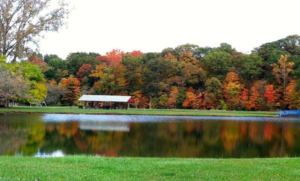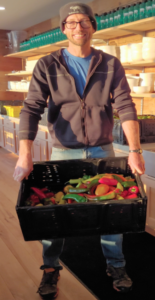 Bellwether Farm is the new camp, retreat and education center in the Episcopal Diocese of Ohio. As the farm manager, one of my main goals when I walk the farm with young folks is to facilitate an encounter with where our food comes from, an experience with the earth herself. Sometimes I get nervous thinking that I need to communicate some deep truth about the universe, how we’re all connected or how we literally eat ourselves into existence each day. And then I realize that all I need to do is let them be on the farm — with the plants, with the animals and with the soil. Eating a cucumber straight off the plant is pure magic, even if you don’t understand photosynthesis. It’s healing. It awakens something deep within us.
Bellwether Farm is the new camp, retreat and education center in the Episcopal Diocese of Ohio. As the farm manager, one of my main goals when I walk the farm with young folks is to facilitate an encounter with where our food comes from, an experience with the earth herself. Sometimes I get nervous thinking that I need to communicate some deep truth about the universe, how we’re all connected or how we literally eat ourselves into existence each day. And then I realize that all I need to do is let them be on the farm — with the plants, with the animals and with the soil. Eating a cucumber straight off the plant is pure magic, even if you don’t understand photosynthesis. It’s healing. It awakens something deep within us.
 Before I go further, though, what is a Bellwether? I often hear this question while working at a place called Bellwether Farm. The term comes down to us from the Middle Ages, when shepherds singled out one ram in a flock to wear a bell and indicate where the flock was going—the Bellwether. In modern times, a bellwether has come to signify a herald of what is to come. In this sense, it is the Church’s vocation to be a bellwether of the kingdom of God, and the vocation of every Christian is to be a bellwether of God’s love, which includes our healing of the earth.
Before I go further, though, what is a Bellwether? I often hear this question while working at a place called Bellwether Farm. The term comes down to us from the Middle Ages, when shepherds singled out one ram in a flock to wear a bell and indicate where the flock was going—the Bellwether. In modern times, a bellwether has come to signify a herald of what is to come. In this sense, it is the Church’s vocation to be a bellwether of the kingdom of God, and the vocation of every Christian is to be a bellwether of God’s love, which includes our healing of the earth.
As the virtue of that goal takes root in my heart, I begin to ask myself: How do we heal the earth? It feels like such an overwhelming aspiration at a time when global crisis, climate change and species extinction regularly headline the news. We have lost so much, and we continue to lose more. This is something to be suffered and mourned.
And while I sit here and mourn the loss, I’m reminded of those places in Scripture, where people cry out, “What must I do to be saved?”
I wonder if the more urgent question we are all crying out today is: “What must we do to save our home place?” How do we care for our beautiful earth? Scientific answers abound, which we must surely heed. However, a spiritual response is needed as well, which has to do with affection. How do we fall in love with the places we call home?
To paraphrase the Senegalese environmentalist Baba Dioum, we won’t save places we don’t love, we can’t love places we don’t know and we can’t know places we haven’t learned.
In keeping with this sentiment, the Diocese of Ohio has chosen a patch of earth we affectionately call Bellwether Farm as our place to learn, know, love and share with others. It is our place to stop, smell, listen and allow our roots to go down deep. The property itself is bordered on three sides by the ever-winding Vermilion River and includes farmland, woodlands, meadows, hiking trails, picnic pavilions, playing fields and a five-acre pond. This new center exemplifies green building and features super energy-efficient structures, renewable energy technology, water reclamation systems and repurposed materials. Together, the site and its facilities serve as vehicles for teaching the wider community about sustainable living and care of this good earth.
In November 2017, we were honored to host Bishop Curry at the dedication of Bellwether Farm. During his address, he saw a vision for this place being a root factory.
He said, “You aren’t just building a conference center, but you’re creating a root factory, where people can come and reconnect with their roots, to the source of life itself, finding strength in the soil, the strength of life, to find the God who made us and the God whose life force, called love, sustains us.”
We saw this vision really come alive this year as people from all walks of life came to Bellwether and experienced the beauty of the land, watched the stars in the vast open sky, walked the farm, pulled root vegetables straight out of the soil for meals, and connected with animals and “all God’s critters” (as the song goes).
We were able to offer immersion programs and hands-on experiences to school groups, 4-H clubs, Boy Scouts, volunteers, summer campers and retreat guests alike — seeking to teach healthy social, nutritional and environmental practices, while providing a safe context in which to encounter God’s creation. Among all the retreat groups, we were especially delighted to host the National ECW board meeting this past October.
As I reflect back on the year, I wish that I had written down all the profound moments people had on the farm as they connected with the earth and where our food comes from.

Written by: Kyle Mitchell, Farm Manager
However, I do remember one story of planting corn with our camp counselors. With the chickens nearby, the flowers starting to bloom around us and soil all over our hands from planting corn, I could see one of our counselors reaching for words to describe what she was experiencing.
She tried a few lines to explain and then finally blurted out, “I feel like a real person!” I smiled and nodded, not completely understanding and yet somehow fully understanding. She was reconnecting with her roots.
It is these experiences that we seek to model and cultivate in our work, worship, service and play — from our shared life on this land to our farm-to-table meals, our sustainable farming practices and our ever-growing affection for this place we call Bellwether Farm.
As we approach and celebrate Earth Day 2020, what patch of earth are you stewarding and growing in affection for?
